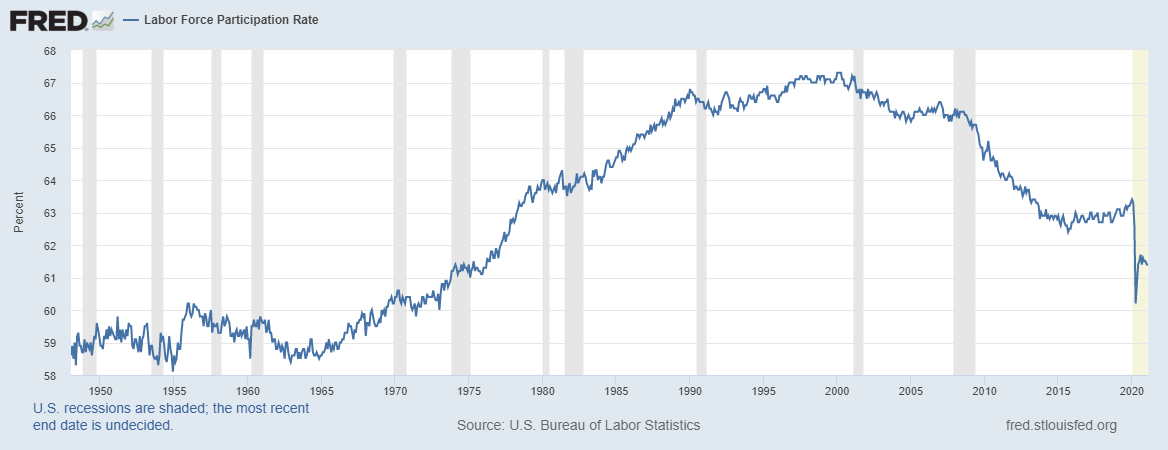March 27th, 2021: Greetings from Taipei. Here’s a pic of Taipei 101 (the third tallest building in the world) behind a military village setup after World War II.
#1 NFTs as Patronage (h/t Kris A.)
I thought this essay gave a convincing argument for the potential of NFTs to serve as ways for creators to fund their work. Here is how they say it would work at a high level.
A virtual, collectible asset (think something similar to a baseball card) that supports a specific project is issued on a blockchain, where-upon its owner must always specify a sale price. Anyone can, at any time, buy this collectible asset from its current owner at this self-specified sale price.
The owner cannot readily set an exorbitantly high-price, because they must pay patronage according to a percentage rate (say 5%) of their self-specified sale price towards the project that the virtual collectible supports.
If they cannot pay this patronage fee, then the virtual collectible is destroyed or foreclosed, the latter which allows a new owner to take ownership of the collectible at a price of zero.
I could see this working in music really well and even with something like supporting this newsletter. I could hypothetically create 5 Boundless Super Supporter Tokens, sell them for $100 each and then take a 20% royalty on all future sales. I’d get $100 from the initial sale and then if you re-sold it in a few years when you got sick of my writing, I’d get 20% of the higher sale price and you’d get 80%. So you get a $140 return on your “investment” and then I’d get $60 from the second sale and then 20% on all future sales.
Would love thoughts on this from people with more insight!
#2 Thoughts on “Should Gig Work Be Government Run?” from the New Yorker (h/t Dan P.)
The New Yorker posted an essay this week titled “Should Gig Work Be Government Run?” that seemed like a nice piece on the surface (who doesn’t want to help the gig economy) but sounded like another piece of policy around the gig economy that lacked awareness of why people might choose to become gig workers.
First, its conception of gig work is that it is only people who are exploited and would instead prefer a simple career ladder:
“The phrase ‘gig work’ has become synonymous with a particularly unpleasant exploitative model of labor markets, but it doesn’t have to be that way,” Rowan told me recently. “People can work irregular hours on their own terms and build portfolios of employment and progress upwards on a ladder—but only public agencies can make that model work, because they have unique needs and leverage and authority.”
Or simply that anyone in gig work is an “irregular”:
Rowan divides gig workers into three categories. There are the “voluntary irregulars,” who choose to take on gigs such as driving for Lyft or similar companies. There are the “forced irregulars,” who want full-time jobs but can’t find them, and so turn to gig work out of necessity. Finally, there are the “core irregulars,” who can’t work full time because of medical or family circumstances and depend on gig work for its flexibility.
I think what you see in reality are three types of people in gig work:
People who are actively choosing this path and understand the tradeoffs with time, money, and freedom
People who have lost interest in many of the jobs that are available because the pay sucks, they rather take welfare and spend time with their kids, or they just have been out of the full-time job market long enough and don’t want to go back
Those who really are struggling and could use some help
People who propose plans about the gig economy claim to help people in bucket #3 and fail to understand people in bucket #2. Listen to this prisoner who was being “re-educated” at a work ethic prison camp I highlighted in issue #126:
Russell wasn’t similarly convinced: ‘My perspective of jobs while I’ve been incarcerated is that it’s all pointless. They expect us to work and slave away for a petty amount of money … The worker’s mind isn’t much different from the criminal’s mind. They’re just different approaches to making money. I would know.’
If you really wanted to help people in the gig economy you’d be talking about better versions of healthcare and better ways for people to share in the upside of the platforms they participate in. Obamacare was passed because our labor economy was not able to deliver healthcare to citizens. It’s time to move on from the idea that our employers should be the only ones managing our healthcare.
On the positive side, I would bet that the Biden child credit from the stimulus will have a positive impact on people that are struggling in the gig economy with kids. I just don’t trust that any of these plans really care about any of that. Instead I think the reality is closer to what Venkatesh Rao wrote about in September about why politicians were pushing hard against the gig platforms:
There is no great mystery as to why traditional labor politicians would push this kind of legislation: it is better to have 10 people beholden to you for a paycheck job than for 100 people to have the option to work in a flexible way without being politically beholden to any source of political patronage. This kind of calculus is the foundation of what is known as clientelism. It is a kind of politics that is nearly 200 years old.
Essentially the best way to get votes is to make them beholden to you and the best way to do that is to turn them into full-time workers.
I am not against this idea, I just am quite bored that these are the only proposals you see around the future of the gig economy. The US job market has been producing more bad jobs than good jobs per year since 1990 and people are dropping out of the labor market in droves. Labor participation right now is the same it was in 1976.
We need a new vision of how work fits into our lives. Full-time jobs for all seems to be thinking from the wrong starting point.
#3 Quotes - The Dangers Of Radio
I like reading history because it makes you realize that we seem to have the same debates about the same things over and over again. This time is different!
I found these 1929 essays on the promises and dangers of radio fascinating:
Pro-Radio
But the Greeks did not foresee radio, with its revolutionary effects upon the mechanism of democratic government. They did not imagine that the day would come when spellbinders like Demosthenes would give way to a Herbert Hoover talking confidentially to a whole continent. . . .
Anti-Radio
Formerly, despite the movies, the automobile, the correspondence course, and the appalling necessity most of us feel for working at two or three jobs in order to be considered successful, we still had some leisure time. But radio, God’s great gift to man, eliminated that last dangerous chance for Satan to find mischief for idle hands. There is now very little danger that Americans will resort to the vice of thinking.
#4 Links
Can You Search For Meaning? (h/t Matthias)
This study says no:
Findings suggest that people lacking meaning search for it; the search for meaning did not appear to lead to its presence.
4-Day Workweeks In Spain
Spain is trying the four-day workweek with some government backing. Should be interesting to see the results in a few years.
While the exact details of the pilot will be hashed out with the government, his party has proposed a three-year, €50m project that would allow companies to trial reduced hours with minimal risk. The costs of a company’s foray into the four-day work week, for example, could be covered at 100% the first year, 50% the second year and 33% the third year.
#5 Friends of Boundless Corner
🔗 A reply from Diego Reeb a newsletter reader following my post on networks and how he made a pretty big shift through an online course.
I recently started working and learning from a consultant from England with 20 years of experience. He is currently starting a nonprofit that will act as a consultant to other nonprofits.
I connected with him through an online course on grant writing (that’s my job right now). I cannot imagine how I could have (a) connected with someone like this 5-10 years ago and (b) started working on consulting projects when I have zero consulting experience. Yet through common interests and shared values I have this amazing opportunity to get my foot in the door in an industry I’ve never been in.
I bring this up to say that I am alongside you, watching the old patterns shift. On my end I am excited what these shifts will do to the world of therapy, social work, and the human services field in general. I hope I can help others at some point within these fields make sense of what’s happening and how they can make shifts in their own work, especially to minimize burnout.
Pretty cool. I love stories like this so send them in if you have them!
📩 Alex Pang started a newsletter exploring rest and the 4-day workweek. Looking forward to future issues. I interviewed him a couple years ago here.
🏫 Packy McCormack has a deep post on On Deck that is a nice addition to the one I wrote a few weeks ago. I continue to think On Deck is one of the most interesting companies out there because on surface its a company but it’s really mindset shift in how we think about talent and credentials.






